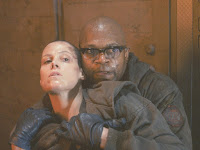Rewatching the previous two Alien movies, I stuck with the original cuts, which I generally prefer unless a movie has been drastically altered from a director's vision. In the case of Alien, Ridley Scott actually also prefers the original cut to the so-called "director's cut" (which I did see in theaters in 2003), and for Aliens, I just have no interest in watching even more of what is already a very long movie, even though James Cameron favors the longer cut, as do many fans (I'm not sure I've ever seen that version, actually). But for Alien 3, I decided to take a chance on the "Assembly Cut," a version put together from director David Fincher's original edit, although not an actual "director's cut," since it was reconstructed without Fincher's involvement. Alien 3 had a notoriously troubled production history, and Fincher has since disowned it entirely, but I wanted to at least come close to seeing the movie he would have made without studio interference.
It's an admirably bleak and austere movie, which is what many people dislike about it, and it turns off a lot of fans by unceremoniously killing Cpl. Hicks (Michael Biehn) and young Newt (Carrie Henn) before the opening credits have finished rolling, with neither actor actually appearing in the movie (Lance Henriksen shows up briefly as a nearly destroyed Bishop, and later as Bishop's human creator). I understand that people grew attached to those characters, but as someone who found the sentimental tone of Aliens a bit grating at times, I wasn't bothered to see those characters killed off, and their deaths give Ripley an extra haunted quality that Sigourney Weaver plays very well. They certainly aren't forgotten about, and the scene in which Ripley examines Newt's body for signs of alien infestation is quite touching and melancholy.
The whole movie has a melancholy tone, with Ripley as a somber and shaken survivor stranded on a prison planet in the backwater of space, populated by a handful of male convicts who've formed a sort of religious commune. It's an effective change from the camaraderie of the Nostromo crew or the Colonial Marines, with Ripley as a mistrusted outsider. Charles S. Dutton is quietly powerful as the prisoners' religious leader, and Charles Dance, now best known for Game of Thrones, makes a surprisingly sympathetic friend and confidant for Ripley. Weaver is as good here as she was in the previous movies, with the same determination and competence, but tempered by a weary resignation, especially once she learns she's carrying the alien queen.
Although it's often cited as an AIDS metaphor, to me the alien in the movie functions more like a cancer, especially in the scene in which Ripley gets a body scan to discover the queen growing inside her. It's reminiscent of similar scenes in medical dramas, as the patient gets the devastating news of a tumor. With her shaved head and lean physique, Ripley even looks a bit like a cancer patient, especially late in the movie as she starts feeling more and more ill thanks to the malignant presence in her body. (Related to that, one thing that disappointed me in the Assembly Cut was the change to the final shot of Ripley, as she plunges herself into an incinerator: In the theatrical cut, we see the alien burst from her chest at the last second, and it's a powerful, visceral moment; Fincher apparently preferred simply to show Ripley plunging to her death, without that final jolt.)
Even if the illness metaphor is a bit muddled, the stark environment and the volatile personal dynamics make for a tense, engrossing movie. The big finale is a bit confusing, and the longer cut incorporates two separate elaborate plans to catch the alien, at different points in the movie, which makes that final convoluted sequence a bit redundant. While the design of the alien is scarier and more menacing than before, the effects are sometimes clumsily incorporated into the frame, a result of making a movie during a transition period in effects technology. Alien 3 certainly has its flaws, and the longer cut isn't a magic solution to them. But it's a severely underrated movie that takes the series in another interesting direction, and it deserves a better reputation than it has.






No comments:
Post a Comment